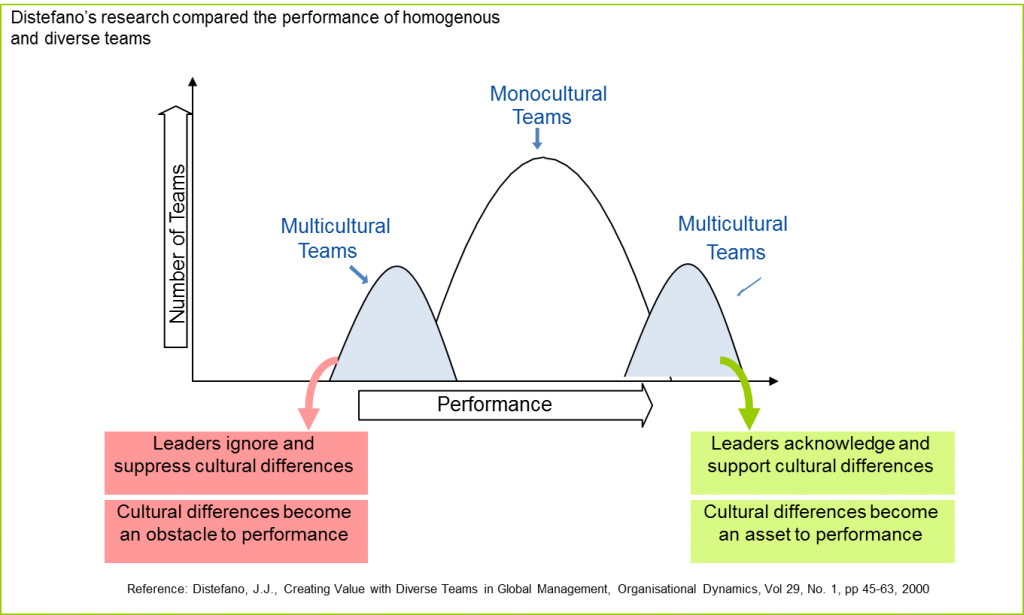
Not to beat a dead horse, as the saying goes, because I know that I have said this many times before, but I think it is critical to separate the ideas of traditional diversity and inclusion training that raise awareness and sensitivity from the idea of cultural competence. Competence is defined as possession of required skill, knowledge, qualification, or capacity to understand and perform for desired outcomes. One cannot learn a skill in a 4 or 8 hour event based training. It requires ongoing learning that consists of exposure to difference, deep experience in culturally different situations and formal education to acquire a theoretical framework.
That being said, why would anyway want to invest the time it takes to advance in cultural competence?
Here are four compelling reasons:
- Globalization: It is clear to all of us that we have passed the threshold, tipped over into a world that is truly global. No longer is it accurate to say that “we will be more global in the future.” We are global now. Many fortune 100 companies employ more than half of their workforce outside the United States. As a result of reduced trade barriers, mergers and acquisitions are occurring between US based companies and companies with headquarters outside the United States.
[dropshadowbox align=”center” effect=”lifted-both” width=”350px” height=”” background_color=”#ffffff” border_width=”1″ border_color=”#dddddd” ]An example of why cultural competence is important in our globally connected world:
In a recent conversation with an executive of a US based retailer whose parent company is European, he lamented that the European decision makers just did not understand American’s shopping habits are very different from those in the retailer’s European country headquarters and decisions were being made that were just not working. As a result the retailer is losing significant market share.[/dropshadowbox] - Virtual Nature of Work: As a result of globalization and technology advances our work is becoming more virtual. Global teams, who often never meet face to face, are formed to solve, design, innovate, etc. AON Consulting’s Benefits and Talent Survey found that 97 percent of respondents said their organizations either planned to increase virtual work and telework options or keep them at the same level.
[dropshadowbox align=”center” effect=”lifted-both” width=”350px” height=”” background_color=”#ffffff” border_width=”1″ border_color=”#dddddd” ]An example of why cultural competence is important for virtual teams:
Some years ago, I worked with a company that opened a call center in India. A virtual team was formed to develop processes and procedures for how the call center would accomplish its goals. After a year of meeting monthly, it was obvious that the goals were not being met. Cultural differences in communication and hierarchy which were not understood and therefore not addressed. The company lost a great deal of money.[/dropshadowbox] - Innovation: Many studies have shown that diverse teams, when managed well are more innovative than homogenous teams. When I say “managed well”, it means that the leaders of these teams are culturally competent and know how to leverage the differences. The graph below shows a study conducted by researcher Distefano. It points out that when leaders suppress or ignore cultural differences (i.e. they are not culturally competent), multicultural teams do not perform as well as monocultural teams. However, when the leaders acknowledge differences (i.e. are culturally competent), the diverse teams perform better.

- Attracting Top Talent: Recruiters who are not culturally competent may miss good talent if they do not comprehend how different cultures may respond to interviewing situations. Some traditionally western standard interviewing questions may not work well in other cultural contexts. Additionally, unconscious bias plays a role in the application and interviewing process. The famous MIT study that was conducted several years ago showed that applicants with “black” sounding names were 50 percent less likely to be called for an interview even though they had identical qualifications.
[dropshadowbox align=”center” effect=”lifted-both” width=”350px” height=”” background_color=”#ffffff” border_width=”1″ border_color=”#dddddd” ]An example of why cultural competence is important for interviewers:
An interviewer from an “individualistic” culture who was interviewing someone from a “group” oriented culture asked the question: “tell me what you accomplished in your last job. The interviewee kept answering the question with “we” no matter how hard the interviewer tried to encourage “I” answers. Culturally competent interviewers recognize such differences and can adapt their approach. In this case the person was not hired because the sentiment was “She could not even talk about her accomplishments”. [/dropshadowbox]
Becoming culturally competent does not mean that we know everything there is to know about other cultures. This would be impossible. It means that we have enough knowledge to recognize when patterns of cultural difference may be present and are then able to probe in ways that enhance our understanding of the situation from a different cultural perspective than our own.



















Thank you for a great set of cultural competence and its importance! I very much appreciate that you are advocating a skill-based conception. It is very consistent with the way we have been thinking about it. Competing notions often reduce it to an orientation or attitude towards cultural difference exemplified by displays of respect.